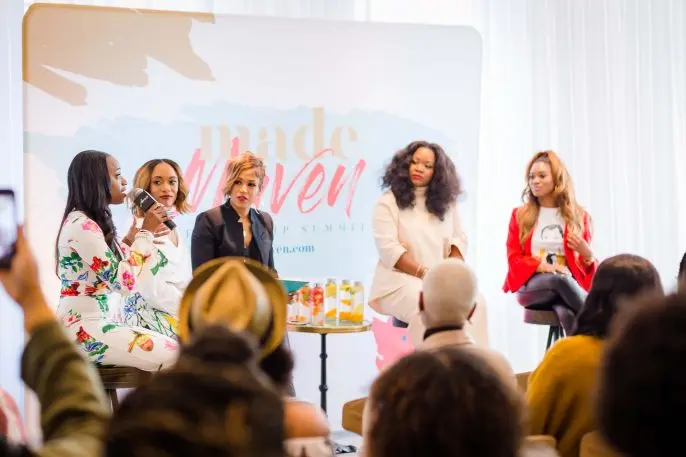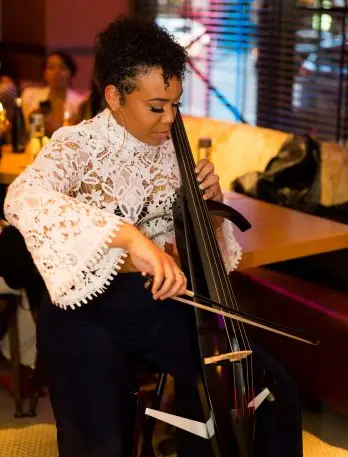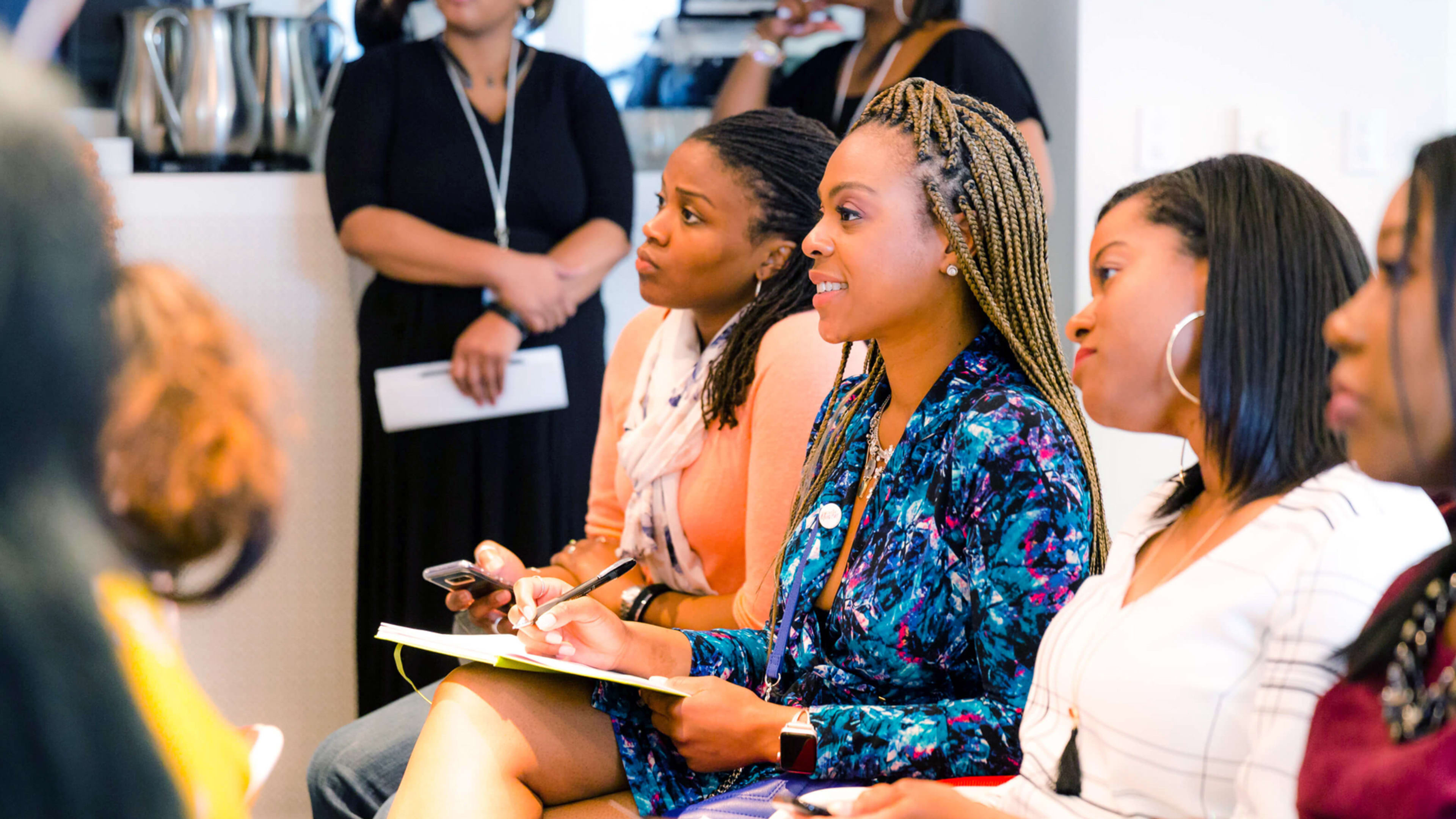Within the last few years, a new brand of business conferences like Create & Cultivate, Girl Boss Rally, and Re:Make have sprung up to cater to millennial women. They attract influencers, content creators, and young professionals. While these conferences may seem on the surface like little more than beautiful people in flower crowns in front of pink backdrops, they are also big business. According to the Experience Institute study, “43% percent of millennials report that they are investing their time in professional development by attending conferences, conventions, and exhibitions for educational and networking purposes,” increasing the event space for millennial conferences.
These conferences are creating spaces for young women to network, gain professional development, and hear from women their own age who have found success. However, some millennial women have found there’s something missing.
Related: Millennial women’s business conferences: safe space or pink silo?
Hollace Henderson, a public relations manager at TechStyle Fashion Group, has attended Create & Cultivate as both an attendee and a sponsor. She says that she would love to see the conferences tap into local, black-owned businesses.
Black millennial women are a part of the fastest-growing group of entrepreneurs., and they are turning to conferences that are aimed at them. In the last few years, more have popped up, including Summit 21, Hustle Her Way Summit, MADE Maven Leadership Summit, Brown Girls Love POWER Day and others.
While new, some have seen impressive growth. Summit 21 for example is an event extension of 21 Ninety women’s lifestyle website founded by Morgan DeBaun, whose company, Blavity Inc., raised $2 million in VC funding last year. The conference (formerly known as EmpowerHer) entered its third year in 2018 with 1,200 women attending this year, nearly doubling their attendance from last year’s 500 attendees (and on par with Create & Cultivate’s around 1,500 attendees).
Whitney Headen, who has attended Girl Boss Rally, Create & Cultivate, and Blavity Inc.’s Afro Tech, noted the difference between general market conferences and ones that are catered to black millennials. “As a black woman, [the black millennial conference] experiences were extremely different than Girl Boss or Create & Cultivate because they really focus on an element of community. One of the similarities in all of these experiences is that they focused as much attention on getting to know your fellow attendees as they did on the panelists and speakers,” Headen says.
The lack of inclusion that Henderson and Headen experienced at the general market conferences has shaped how black women are investing in conferences. According to Catalyst, 30% of black women often or always attend conferences and meetings targeted to their race, which is 44% higher than Latinas and Asian women.
“If you are attending these professional women’s conferences and don’t see any black women, you begin to think that this is something that black women don’t do; that we don’t exist in the professional space, and that is just flat out wrong,” said Sabine Quetant, head of digital operations for 21Ninety. She managed Summit 21’s programming this year.
Related: Black women are founding way more startups. So where’s the funding?
“Why is it that we are constantly underpaid, overworked, and not getting the mentorship or the resources that we need to actually excel and grow? I see that we’re struggling in that area of having advocates to speak on our behalf in boardrooms and different areas where we were not present, ” says Kris Christian, founder of the MADE Maven Leadership Summit, which hosted its inaugural gathering in Chicago this year. These women say that black millennial women are looking for impactful and teachable content that they can apply to their lives when they return home.

Fewer flower walls, and more practical, skill-based workshops
“We have all been to an event where it was very inspirational, but that was it. There were no tactics, no strategy, no nothing, and people invest in these events. They want to leave with some kind of return on their time investment where they can apply what they just learned,” says Kyshira Moffett, who started the Hustle Her Way Summit three years ago. She planned the Pittsburgh-based summit in five months after growing tired of attending events where she wasn’t learning or meeting new people to add to her network.
Headen loved her experience at Create & Cultivate, but soon realized that the content and networking opportunities did not meet her professional needs. “As great as the conference was put together from pre-sale to event day, the content experience was lackluster for a senior-level executive like myself. Also, the representation and diversity of topics missed the mark for me. You have to have one or two women of color or minorities on a panel to tout a diverse experience,” she said. Create & Cultivate did not respond to a request to comment.
Feature a variety of perspectives with more inclusive panels
Speaker selection is an important element of whether someone will pay money to attend an event. “I look at the speaker list. I’m senior level in my career, so I need to make sure that the experts on each panel are people I can learn from. It’s always important to me that the people leading these conversations have a proven track record of success,” says Headen.
One way Christian vetted her lineup of speakers was by using her network who she knew could speak to different topics of expertise. “I could attest in advance that they could really share knowledge that was never heard before. Our attendees said that there was new insight, which was refreshing for some people, because they would go to some events and [hear] the same type of tips and tools over and over again,” she said.

Related: This is what it’s like to be the only black woman founder at a pitch event
Challenges in the market
The challenges black millennial women conferences face is getting more women interested in investing in themselves by buying into the experience, and getting the sponsors to invest in black women. Summit 21 organizers experienced some pushback from attendees on price for their $350, two-day conference ticket . “At first glance, ticket prices can seem high for a two-day conference; especially [for] attendees who are students or burgeoning entrepreneurs. However, I’ve seen those Beyoncé ticket prices, and if we can hand over our coins to Bey, then we can certainly invest in ourselves to reach our own Beyoncé status,” says Quetant. But black millennial women are still significantly underpaid in comparison to their white women counterparts, so having that disposable income to book transportation, lodging, and a conference pass can become pricey. Event producers look for sponsorship to help lower those attendee costs.
“I would love for us to be able to really blow these conferences out the water, the same way I see our general market counterparts doing it. Part of that is going to require obviously more legwork on our end, but it’s going to require partnership with some of these brands and sponsors and a willingness from our audience to pay for the experience. A lot of us as women of color are just now starting to understand the importance of investing in these types of experiences,” explains Brown. The balance between audience investment and brand partnership will help put many black millennial women conferences in the same playing field as their general-market counterparts in terms of getting the funding to pay for high-level speakers, celebrity guests, and beautifully executed experiences.
Sponsorship was also a challenge for Moffett because she wants to create a experience produced and sponsored by black women. “I want this to be for black women by black women, and I do get a diverse crowd. About 80% of my sponsors were black women-owned businesses, and I also made my sponsorship packages small-business friendly,” she says. She’s had larger companies sponsor Hustle Her Way, but she still has her concerns about whether larger corporations care about her demographic. “I need them to actually care about us. I need to know that they have a commitment to diversity and inclusion and empowering women,” she says.
With several sponsors like Hilton and American Airlines, even Summit 21 had to really drive the importance of investing in their audience. “Sponsors don’t always immediately see the value and benefit in connecting with black women through these event sponsorships. Black women are the leading group of business owners in the U.S., the most educated group, and emerging as a strong political group. We are influencing every aspect of our society, and therefore, sponsors should be jumping at the chance to engage with us,” said Quetant.
The balance of both content and experience is something that not only black women conference producers are striving to maintain, but creating affordability is also a priority. The millennial women conference scene is new, but no matter the target audience, the opportunities to be inclusive are ever present as the industry continues to grow.
Editor’s Note: After publication a Create & Cultivate spokesperson responded with this statement: “The mission of Create & Cultivate is to entertain, empower and enlighten all women in an inclusive environment. Diversity is a huge initiative for our brand and we make sure to openly have these discussions at each conference. We have always built the business based on feedback from our attendees and partners. We realize there is always room for improvement and we continue to strive to offer all women the resources they need to succeed. Further, we are in full support of all conferences and events that aim to champion women in any way, shape, or form, because the more we band together, the stronger we are.”
Recognize your brand’s excellence by applying to this year’s Brands That Matter Awards before the early-rate deadline, May 3.
